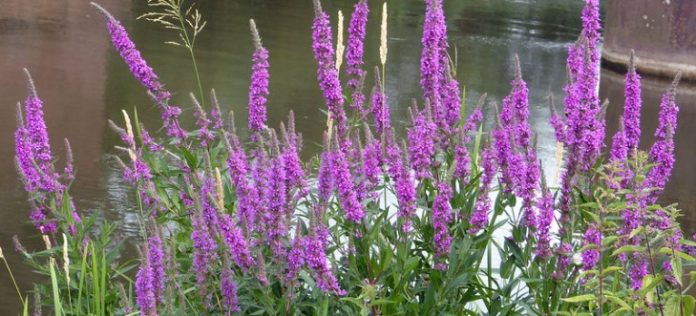by Jay Watson, Co-Executive Director, New Jersey Conservation Foundation
Spring is months away, but as warmer weather arrives we can expect a familiar sight at garden centers and nurseries in New Jersey: a wide offering of non-native woody plants and perennials from foreign landscapes.
These plants may be attractive, with blooms or fall colors that stand out in gardens, or easy to grow for beginning gardeners. Unfortunately, many are invasive, meaning they won’t stay put where they’re planted. Instead, they spread aggressively through our native landscape, crowding out native plants, providing virtually nothing for pollinators or migratory birds, and seriously degrading natural ecosystems.
Unfortunately for this state we’re in, Gov. Phil Murphy just vetoed a bill aimed at limiting the spread of invasive plants plaguing the Garden State. The bill had been passed unanimously by our state Assembly and Senate, and would have prohibited the sale, distribution, import, export, or propagation of certain invasive plants without a permit from the Department of Agriculture.
The initial list of just 30 invasive plants included Japanese barberry, winged burning bush, tree-of-heaven, autumn olive, English ivy, Japanese and Chinese wisteria, Callery/Bradford pear, purple loosestrife, European privet, and multiflora rose.
In addition, the bill would have re-established the New Jersey Invasive Species Council, an advisory group that was active from 2004 to 2010. Before being disbanded, the council produced an excellent 2009 report detailing the spread of invasive species and calling for action.
Although Murphy called the bill’s goals “laudable,” he said in his veto message that it doesn’t adequately consider the “existing authority” of the New Jersey Department of Environmental Protection (NJDEP), and could be “duplicative and unproductive.”
Murphy’s veto came as a disappointment to conservationists, who have been advocating for years for legislation confronting the problem of invasive species. The bill, which addressed only invasive plants, was viewed as a foundation upon which more comprehensive legislation (including invasive animals and microorganisms) could be built in the future.
Action to combat the spread of invasives is sorely needed. Though New Jersey is known as a national environmental leader, it is one of only five states in the entire nation without an invasive species law on the books. All of our immediate neighbors – New York, Pennsylvania and Delaware – have invasive species laws, making us the proverbial “hole in the donut.”
As New Jersey’s 2009 invasive species report noted, thousands of non-native species have been introduced to the state from other parts of the world. Although not all have become invasive, those that have pose serious threats to our environment and economy.
New Jersey has been overrun by about 200 invasive plants and 100 other invasive species, including insects, fish, and pathogens, according to testimony by members of the New Jersey Forest Stewardship Task Force in 2022.
Most invasive plants were introduced by unsuspecting gardeners and landscapers, who purchased them legally. But once they escape from yards and gardens, their vines and extensive root systems often outcompete native plants. A forest or meadow taken over by invasive plants becomes inhospitable to insects, birds and other animals that depend on native plants, resulting in a collapse of the food web and ecosystem.
Many insects have evolved over millennia to depend on certain plants. For example, the caterpillars of monarch butterflies feed only on the leaves of milkweed plants. A meadow that fills with invasive plants at the expense of milkweed becomes a food desert to monarch butterflies; they will disappear from that place. Nature abounds with other examples of insects (and other animals) dependent on particular native plants.
Invasive plants also attract invasive and harmful insects. For example, the tree-of-heaven is the favorite food source of the spotted lanternfly, an invasive insect that also attacks agricultural crops and native trees. The state actively encourages property owners to eradicate tree-of-heaven, so it makes sense to also limit the propagation and sale of other alien trees and shrubs that are becoming problems.
Although the invasive species bill from the Legislature’s 2022-23 session is dead, the good news is that supporters aren’t giving up. Sen. Bob Smith, longtime chair of the Senate’s Environment and Energy Committee, has already introduced the same bill in the 2024-25 session with co-sponsors.
A hearing has not been scheduled, and clearly a dialogue is needed to fix whatever shortcomings were envisioned by Murphy, in order to gain his signature. Hopefully this will happen early in the new legislative session.
“This is something that’s extremely overdue, and we need to get it done,” said Michael Van Clef, head of the New Jersey Invasive Species Strike Team, part of the Friends of Hopewell Valley Open Space. “Let’s not wait until we’re absolutely the last state” without an invasive species law.
Addressing the threats posed by invasive species won’t be easy. Resources will be needed to limit the spread of invasive species that are already here, prevent new invasions, and restore damaged ecosystems.
But it’s encouraging to see the bipartisan support the invasive plants bill has gotten in the Legislature – and to know that Gov. Murphy seems to agree, at least in principle, that the problem must be addressed. Efforts to combat invasive species throughout the Northeast will be more successful if all neighboring states are working toward a common goal, and making invasive plants less available.
To read the invasive plants bill as it currently stands, go to www.njleg.state.nj.us/bill-search/2024/S1029.
To learn more about invasive species, and see the Strike Team’s “Do Not Buy” list, go to www.fohvos.info/invasive-species-strike-team/info-center/.
And for information about preserving New Jersey’s land and natural resources, visit the New Jersey Conservation Foundation website at www.njconservation.org or contact me at [email protected].


